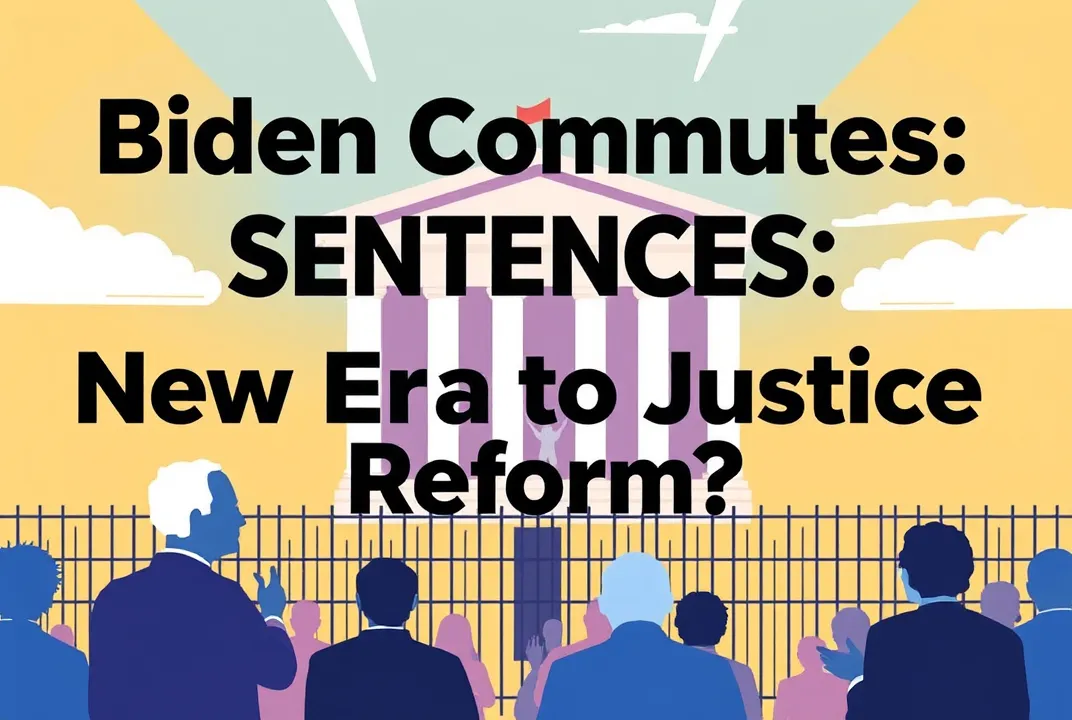The New Era of Justice Reform: Biden's Commute of Sentences
In the twilight of a summer day, the sun cast a warm glow over the White House, as President Joe Biden made a landmark announcement that would ripple through the corridors of American justice. The commutation of sentences for 75 individuals was not just a routine exercise in executive power; it was a clarion call for a shifting paradigm in the justice system. This pivotal moment was one of the many steps that signified a broader commitment to justice reform in the United States—a movement that had been gathering momentum over years, driven by advocates, activists, and everyday citizens calling for change.
The Ripple Effects of Commutation
The individuals whose sentences were commuted were not mere statistics; they were mothers, fathers, sisters, and brothers—individuals whose lives were negatively impacted by harsh sentencing laws. Many of these people had been serving lengthy prison terms for non-violent offenses, often involving substances that have since been decriminalized or whose enforcement has been softened in many states.
By commuting their sentences, Biden not only offered them a second chance but also highlighted the broader systemic issues at play. The American justice system has long been criticized for its disproportionate impact on marginalized communities, with over-policing and sentencing disparities contributing to a prison population that is both overcrowded and rife with injustice. As Biden's administration took this bold step, it sparked a renewed conversation about rehabilitation, restorative justice, and the need for a more humane approach to criminal justice in America.
The Voices Behind the Movement
Behind the statistics and policy discussions are the real-life stories of those affected. Take, for instance, the case of Maria, a young mother who had been sentenced to 12 years for a non-violent drug offense. Separated from her children, she found herself in a system that often seemed more focused on punishment than on rehabilitation. "I just wanted to provide for my family," she said in an interview after her sentence was commuted. "Now, I get a chance to start over."
Similarly, there was Marcus, a former college athlete whose life took a sudden turn after he was caught in a drug-related arrest. With a lengthy sentence ahead of him, he believed that his aspirations of becoming a community leader, advocating for youth, were dashed. However, following Biden's decision, his life took a turn for the better. "I want to show others that it's possible to overcome adversity," he shared, emphasizing the importance of second chances.
These personal narratives underscore the emotional and social significance of the commutation decision, illustrating the hope it can inspire and the lives it can transform.
The Historical Context of Justice Reform
The Biden administration’s actions are not happening in a vacuum. They are a culmination of years of advocacy from grassroots organizations and social justice movements. The War on Drugs, initiated in the 1980s, has had long-lasting effects on communities across the nation, leading to an explosion in incarceration rates. Today, the United States has one of the highest incarceration rates globally, a stark indicator of systemic issues that have been ignored for too long.
In the wake of this commutation, the conversation extends beyond individual cases. It raises questions about the efficacy of mandatory sentencing laws, the role of rehabilitation programs, and how the justice system can shift its focus from punishment to a more restorative model. Biden’s decision serves as a reminder that systemic reform is necessary, and it resonates with the ongoing efforts to dismantle the cycles of incarceration that disproportionately affect people of color and those from low-income backgrounds.
Political Perspectives on Justice Reform
While Biden’s commutation has been met with applause from many quarters, it has also faced criticism. Some argue that while commuting sentences is a positive step, it does not address the root causes of crime or the systemic flaws in the justice system. Critics call for comprehensive reform that includes not only changes in sentencing laws but also investment in mental health resources, addiction treatment programs, and education.
On the other hand, proponents argue that every act of clemency is a step in the right direction, demonstrating a willingness to confront and correct past injustices. They emphasize that these changes are essential not just for the individuals affected but for society as a whole, advocating for a justice system that reflects compassion and understanding rather than solely punishment.
The Path Forward: A Collective Responsibility
As the dust settles from the recent commutations, it is clear that this moment serves as both an opportunity and a challenge. Advocates for justice reform are energized, emboldened by the administration's actions to push for further changes. Movements are being organized, dialogues are being opened, and a collective consciousness is beginning to transform the narrative around justice in America.
However, change will require sustained advocacy and engagement from all sectors of society—lawmakers, community leaders, activists, and everyday citizens. As Biden’s administration navigates the complexities of justice reform, it is imperative that the conversation continues, recognizing the human stories behind the statistics and the need for a system that values restoration over retribution.
Conclusion: A New Era Awaits
Biden’s decision to commute sentences is a beacon of hope, illuminating the path toward a more equitable justice system. While it represents a significant step forward, it is merely the beginning of a larger movement toward reform. As stories like Maria’s and Marcus’s are shared and amplified, they remind us that justice is not just a legal concept—it's a deeply personal journey.
In this new era of justice reform, the challenge lies not only in addressing existing inequalities but also in envisioning a future where justice is synonymous with compassion, understanding, and opportunity. As we move forward, the question remains: what role will each of us play in shaping that future? The answer lies in our commitment to advocacy, empathy, and relentless pursuit of a justice system that truly serves all its citizens.


 Who is Medrick Burnett Jr? Exploring His Impact and Legacy
Who is Medrick Burnett Jr? Exploring His Impact and Legacy
 Unpacking Jay-Z's Legacy: Impact on Music and Culture Today
Unpacking Jay-Z's Legacy: Impact on Music and Culture Today
 Unpacking the Impact: Biden Pardons and What They Mean for America's Future
Unpacking the Impact: Biden Pardons and What They Mean for America's Future